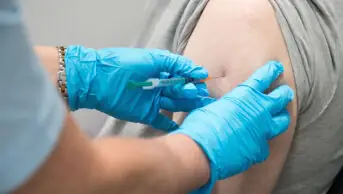
Shutterstock.com
Results from the world’s largest trial for critically ill patients with COVID-19 have revealed that high-dose IV vitamin C was ineffective in the treatment of COVID-19, while simvastatin may be of benefit.
A harmonised, randomised controlled trial (RCT), published in The Journal of the American Medical Association on 25 October 2023, examined data from the ‘REMAP-CAP’ (Randomised, Embedded, Multifactorial, Adaptive Platform trial for Community-Acquired Pneumonia) and the ‘LOVID-COVID’ (Lessening Organ Dysfunction with Vitamin C for COVID-19) trials.
The study included 2,590 critically and non-critically ill patients over 130 sites across 4 continents.
Participants were split evenly into intervention versus placebo groups, where the intervention group received 50mg/kg dose of IV vitamin C every 6 hours for 96 hours.
Researchers assessed the number of organ support-free days among the two groups until hospital discharge. Among critically ill patients, the results showed that the median number of organ support-free days was 7 days for the vitamin C group versus 10 days in the control group (adjusted proportional odds ratio [OR] 0.88) and 22 days in both groups for non-critically ill patients (adjusted proportional OR 0.80).
Critically ill patients in the vitamin C group also had a lower hospital discharge rate of 61.9% compared to the control group at 64.6% (adjusted OR 0.92).
The researchers concluded: “Although the current results do not exclude the possibility of any beneficial effect of vitamin C in COVID-19, it is more likely that vitamin C is ineffective or harmful.”
Researchers working on the REMAP-CAP trial — an ongoing RCT analysing the efficacy of simvastatin (80mg daily) in 2,684 critically ill patients with COVID-19 — also published trial data on 25 October 2023 in the New England Journal of Medicine.
The researchers reported a median of 11 organ support-free days in the simvastatin group compared to 7 days in the control group (median adjusted OR 1.15).
However, the authors highlighted that the results had a 95.9% posterior probability, failing to meet the prespecified threshold for superiority at 99%.
Commenting on the two studies, Lucy Chappell, chief executive of the National Institute for Health and Care Research, which part funds and supports the REMAP-CAP trial, said: “One treatment appears to be beneficial, while the other is ineffective and even potentially harmful.
“These are really important findings providing new evidence on two widely available treatments to help us provide the best care and management for those critically ill with COVID-19,” she said.
REMAP-CAP is an international adaptive platform trial that began in March 2020. It continues to evaluate various treatment options for hospitalised patients with COVID-19, including antivirals, steroids, and anti-inflammatory drugs.
Commenting on the trial, Anthony Gordon, UK chief investigator of REMAP-CAP and professor of anaesthesia and critical care at Imperial College London and Imperial College Healthcare NHS Trust, said: “To have both of these landmark results from REMAP-CAP published simultaneously is testament to the ability of this trial to efficiently evaluate multiple interventions.”


